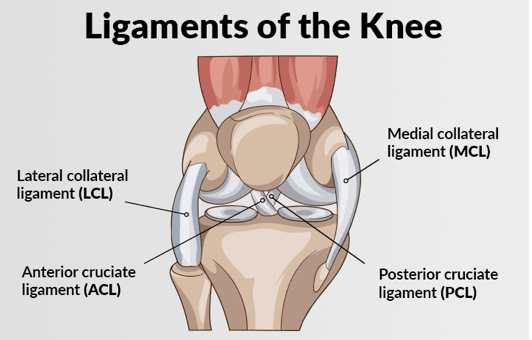Knee Ligament Injury
Knee Ligament Injury: Causes, Symptoms, and Care
Knee ligaments connect the bones and cartilage, as well as holding together and supporting the knee joint. They are made of tough, rubbery connective tissue. Four major ligaments support and stabilise the knee and these can be injured during sports such as rugby, tennis, football or skiing.
- The main ligaments in the knee are the two cruciate ligaments – the anterior cruciate ligament (ACL) and the posterior cruciate ligament (PCL); these are in the middle of the knee, crossing over each other centrally
- The collateral ligaments are the medial (inner) collateral ligament (MCL) and the lateral (outer) collateral ligament (LCL)
- As well as the four major ligaments, the anterolateral ligament (ALL) runs along the outside of the knee and is often damaged at the same time as the ACL

What causes an ACL injury?
What are the symptoms of an ACL injury?
When the ACL tears (ruptures) there is often a popping sound, as well as pain and swelling in the knee, usually within an hour of the injury. Patients usually hobble for a week or so and then things can settle down.
In around 20% of cases, people with an ACL tear can continue with normal activities. However, most people have ongoing symptoms including knee instability (where the knee gives way, especially when you change direction while walking or running) as well as recurrent pain. Having early treatment can prevent further damage being caused to surrounding tissue each time the knee gives way. This includes cartilage injuries and meniscal tears (which affect around 70% of people who have torn their ACL) as well as arthritis.
Anterolateral ligament (ALL) injuries
The anterolateral ligament (ALL) runs along the outer part of the knee, providing stability when pivoting. ALL injuries – caused during twisting movements – affect around 30% of patients who have an anterior cruciate ligament (ACL) injury. Having ALL reconstruction surgery alongside ACL reconstruction, as part of the same procedure, significantly improves the long-term outcome.
Medial collateral ligament (MCL) injuries
One of the most commonly injured ligaments, the MCL provides stability to the inner (medial) part of the knee and feels tight when your leg is straight. It connects your thigh bone to the bone of the lower leg and stops the knee bending inwards. It’s often injured when the knee is knocked sideways and, in some cases, can be damaged alongside other ligaments in the knee.
What are the symptoms of an MCL injury?
Symptoms include:
- A popping sound when you are injured
- Pain, tenderness and swelling on the inner knee
- Feeling as if the knee is going to give way
- Locking or catching in the knee joint

